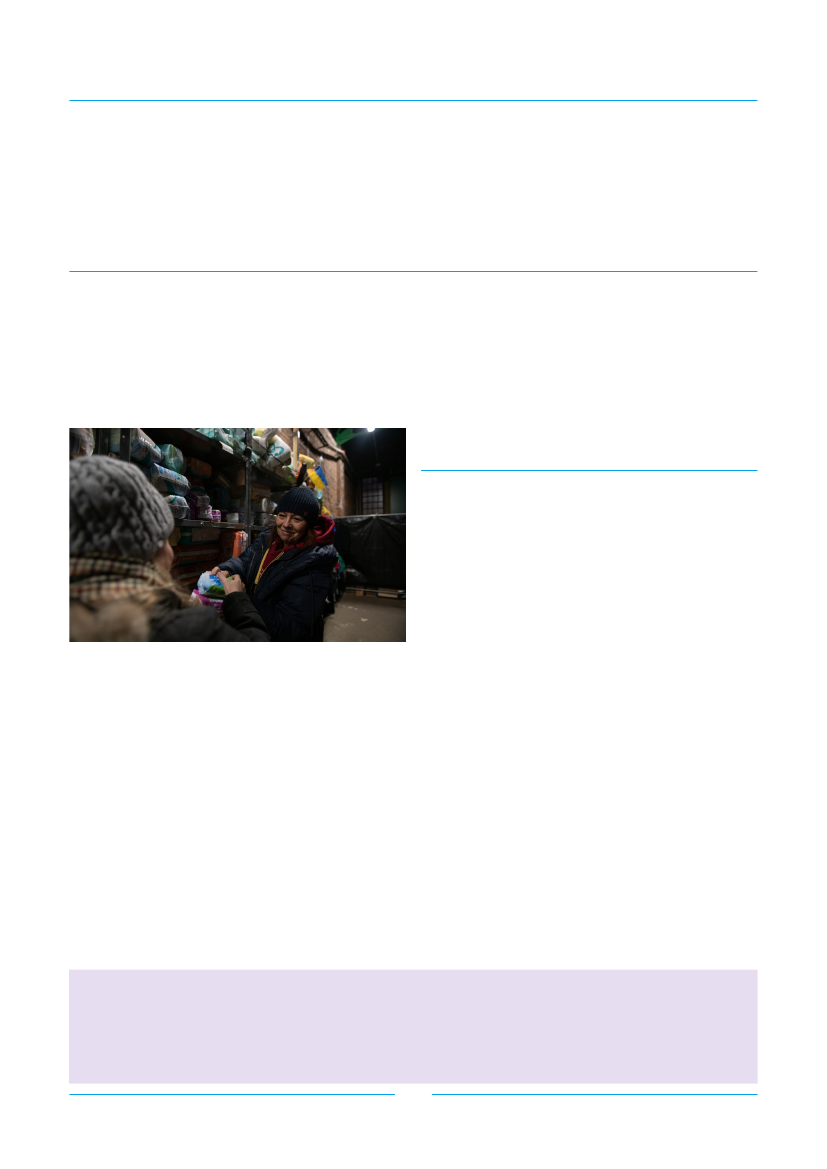
Folketingets Tværpolitiske netværk for seksuel og reproduktiv sundhed og rettigheder 2022-23 (2. samling)
FACTSHEET MARCH 2023
www.countdown2030europe.org
Sexual and Reproductive Health
and Rights are as relevant one year on
UKRAINE CRISIS:
A
year has passed since Russia invaded Ukraine on 24th
February 2022, and during this time, humanitarian
donors and actors, particularly volunteer and grassroots
organisations, have come together to provide various forms of
support for the 17.7 million people
1
that have been affected by
this conflict. As of February 2023, over
8 million Ukrainian refu-
gees
2
have been recorded across Europe and about
5.4 million
people
3
are internally displaced within the country. The majority
of them are women and children.
WHY ARE SEXUAL AND
REPRODUCTIVE HEALTH
AND RIGHTS ESSENTIAL
IN RESPONDING TO
THE HUMANITARIAN
CRISIS IN UKRAINE?
Anyone who has been forced to flee or who lives in an area
of armed conflict is particularly vulnerable, even more so
women, girls, adolescents and marginalised populations.
Peo-
ple’s access to health services may be suspended or the quality
may be low, and they will not have access to life-saving repro-
ductive health care. They are in a dire state of emergency and
further exposed to risk of sexual violence, sexually transmit-
ted infections including HIV, unintended pregnancies and unsafe
abortions.
Amid the terrifying devastation experienced through
a humanitarian crisis, people need first and foremost safety
and protection. Sexual and reproductive health (SRH) services
save lives and prevent further suffering.
The sexual and reproductive health and rights (SRHR) needs of
women, girls, adolescents and marginalised groups in Ukraine
are particularly high.
9.4 million
women are of reproductive age,
and many of them have been forced to flee because of the con-
flict. According to official figures, around
195,000 babies
were
born in Ukraine in 2022. This means that thousands of women
have experienced pregnancy during the humanitarian crisis, with
hindered access to the needed health support, and many of them
have been forced to deliver in basements used as bomb shelters
in dire hygienic conditions
4
. Moreover, as a consequence of the
humanitarian situation caused by the conflict, there has been a
disruption in health service provision, including the provision of
SRH services. In the past 12 months, there have been
747 attacks
on health-care facilities
recorded
5
, including maternity hos-
pitals. As of February 2023, approximately
14.5 million people
within Ukraine were found to be in need of health assistance and
about
3.6 million people
specifically required sexual and gen-
der-based violence (SGBV) prevention and response services
6
,
including as a consequence of the increased reported incidence
of abuse, rape used as a weapon of war
7
and trafficking.
The Polish Women’s Strike runs several refugee reception centres, which provide
hygiene items, winter clothing, baby items, food, legal advice, and accomodation.
"We stand together and remain
a people not defined by the war
but by our strength, resilience
and values. Under shelling, air
raid sirens, without electricity, we
remain committed to supporting
the healthcare system through
provision of essential equipment,
medicine and training for doctors."
DR GALYNA MAYSTRUK
Executive Director of Women’s Health and Family Planning Ukraine
ARE OF REPRODUCTIVE
AGE, AND MANY OF THEM
HAVE BEEN FORCED TO FLEE
BECAUSE OF THE CONFLICT
9.4 MILLION
WOMEN
WERE BORN IN
UKRAINE IN 2022
195,000
BABIES
747 ATTACKS
ON HEALTH-CARE
FACILITIES, INCLUDING
MATERNITY HOSPITALS
REQUIRED SEXUAL AND
GENDER-BASED VIOLENCE
SERVICES
3.6 MILLION
PEOPLE
1